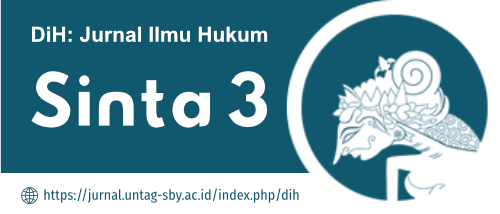EFEKTIVITAS PIDANA PENJARA DALAM MEMBINA NARAPIDANA
DOI:
https://doi.org/10.30996/dih.v11i21.446Abstract
Abstract:Â Imprisonment is the most frequent primary sanction imposed by the judge. It is influenced by classical thinking about retaliation against the perpetrators. Implementation of imprisonment has not been effective to provide coaching and preparing the former inmates to return to society. Prison will only be a place for someone to learn about committing crimes more professional. Negative stigma always attached to ex-prisoners, so they are hard to get back into his social life. One attempt to minimize the imposition of imprisonment is to resolve the criminal matter amicably out of court (through penal mediation). Completion of a criminal case in a peaceful manner will reduce the workload for law enforcement and provide better justice for perpetrators, victims and their families.
Keywords: imprisonment, inmates and penal mediation.
Downloads
References
Koesnoen, R.A., 1961, Politik Penjara Nasional, Sumur, Bandung.
___, 1964, Susunan Pidana Dalam Negara Sosialis Indonesia, Sumur, Bandung.
Leden Marpaung, 2008, Asas-Teori-Praktik Hukum Pidana, Sinar Grafika, Jakarta.
Muladi, 1996, Kapita Seleksi Hukum Pidana, Badan Penerbit Universitas Diponegoro, Semarang.
Mushadi, 2007, Mediasi dan Resolusi Konflik di Indonesia, Walisongo Mediation Center, Semarang.
Tolib Setiady, 2010, Pokok-pokok Hukum Penitensier Indonesia, Alfabeta, Bandung.
Widodo, 2009, Sistem Pemidanaan Dalam Cyber Crime, Laksbang Mediatama, Yog-yakarta.
Jawa Pos, 2014, Over Kapasitas Lapas Tembus 153 Persen Pemerintah Optimal-kan Pemberian Hak Napi, http://www. jawapos.com/baca/artikel/5878/over-kapasitas-lapas-tembus-153-persen.
Downloads
Published
Issue
Section
License
Authors who publish with DiH: Jurnal Ilmu Hukum agree to the following terms:
- Authors transfer the copyright and grant the journal right of first publication with the work simultaneously licensed under a CC BY-SA 4.0 that allows others to share the work with an acknowledgement of the work's authorship and initial publication in this journal.
- Authors are able to enter into separate, additional contractual arrangements for the non-exclusive distribution of the journal's published version of the work (e.g., post it to an institutional repository or publish it in a book), with an acknowledgement of its initial publication in this journal.
- Authors are permitted and encouraged to post their work online (e.g., in institutional repositories or on their website) prior to and during the submission process, as it can lead to productive exchanges, as well as earlier and greater citation of published work (See The Effect of Open Access)










